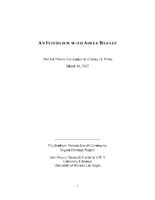Search the Special Collections and Archives Portal
Search Results

Transcript of interview with Carolyn Goodman by Barbara Tabach, August 18, 2016
Date
Archival Collection
Description
Carolyn Goldmark Goodman (1939- ) is the mayor of the city of Las Vegas, Nevada. She began her first four-year term in office on July 6, 2011 and was re-elected for a second term in April 2015. She succeeded her husband of 50 years, Oscar B. Goodman, who served three terms as mayor. Carolyn founded The Meadows School in Las Vegas in 1984, the state's first nonprofit, college preparatory school for pre-kindergarten through 12th grade. She oversaw planning and daily operations of the school for 26 years, retiring in 2010. Carolyn and Oscar Goodman arrived in Las Vegas in 1964. Carolyn Goodman started out working in the hotel industry, and later earned her master's degree in counseling from the University of Nevada, Las Vegas (UNLV) while raising four children. As mayor, Goodman has focused on improving public education and the local economy. She is a board member of the Las Vegas Convention and Visitors Authority and serves on the Las Vegas Global Economic Alliance (LVGEA). She is actively involved in the United States Conference of Mayors (USCM), as a member of its Advisory Board, vice-chair of its Task Force on Education Reform, and chair of the Mayors? Business Council. In 2014 Goodman received the UCSM?s Large City Climate Protection Award. As leader of the Meadows School, Goodman was recognized nationally by the Council for Advancement and Support of Education (CASE) and the National Association of Independent Schools in 2006 with the Seymour Preston Trustee Award for Leadership. She has also been honored by UNLV, receiving the Distinguished Nevada award in 1989, an Honorary Doctor of Laws degree (PhD) in 2006, and Alumni of the Year in Education in 2010. In this interview, Goodman talks about her family background and touches upon her childhood in New York City and attending Bryn Mawr College, where she met Oscar. She discusses the growth of the Las Vegas Jewish population since arriving, efforts to build Jewish community, and her involvement, including with Temple Beth Sholom and the Jewish Federation. In addition, Goodman talks at length about her husband?s political career as well as her own, both dedicated to developing Las Vegas into a safe and prosperous city, with quality education, health care, and arts and culture offerings. She also discusses establishing The Meadows School.
Text

Transcript of interview with Arne Rosencrantz by Barbara Tabach, February 18, 2015
Date
Archival Collection
Description
Arne Rosencrantz is the former president and owner of Garrett's Furniture in Las Vegas, Nevada. Rosencrantz was born on September 27, 1947 in Longview, Washington. He moved to Las Vegas in 1952 and attended Nevada Southern University, now known as the University of Nevada, Las Vegas (UNLV). In 1967, Rosencrantz began working at Garrett's Furniture, and in 1979, he purchased the company and became its president. He was president of the Jewish Federation of Las Vegas from 1987 to 1988, and also served as a campaign chairman for the Federation and chairman of its Young Leadership Program. In this interview, Rosencrantz shares his grandparents and father?s immigration story, which took them from Russian to Portland, Oregon. He also talks about moving to Las Vegas, his childhood experiences, especially within the Jewish community, and reflects on the growth of his family?s furniture business in the city. Rosencrantz has been highly involved in the Jewish community over the decades, including the Young Leadership Program, United Jewish Appeal, Temple Beth Sholom, and the Jewish Federation. He is married to Lynn Rosencrantz and has two children, Marcus and Amy.
Text

Transcript of interview with Miriam "Mimi" Katz by Barbara Tabach, December 10, 2014
Date
Archival Collection
Description
In this interview, Mimi Katz discusses growing up in the Boston area and her schooling, and moving to Washington, D.C. working as a physiotherapist. She returned to Boston and met her husband, and she talks about moving to Las Vegas and adjusting to life here. They became involved at Temple Beth Sholom, and Mimi worked as a conventions coordinator at the Sands and the Sahara. She discusses moving around in Las Vegas from an apartment to a house in the John S. Park neighborhood, working for the Jewish Federation, and helping to develop the Holocaust education program with Edythe Katz, conducting oral history interviews with survivors. She continued working at the Convention Center in the 1980s, and is involved in the Lou Ruvo Center.
Everyone knows her as Mimi. She was born Miriam Green to immigrant parents in Boston, Massachusetts, in 1926. As a youngster she danced, excelled at school and enjoyed an abundance of sports. To pay for her higher education at Massachusetts School of Physiotherapy she worked at Raytheon Manufacturing. In 1957 she married George Katz who swept her away to their honeymoon in Las Vegas. It's a story that she loves to recall-they never left. She sent for her things and energetically settled in to her new hometown and marriage. Mimi found employment with the Clark County School District, began having children (three daughters), and making fast new friends. Many of these friends were from the founding days of Temple Beth Sholom, which roots her to the history of the local Jewish community. In addition, for a decade she worked in community relations for the Jewish Federation. She valued community activism and volunteered over the years for many organizations; such as Easter Seals, Jewish War Veterans, Parent Teachers Association and the Lou Ruvo Center for Brain Health, and many more organizations over the subsequent decades.
Text

Transcript of interview with Harry Sax by Barbara Tabach, April 8, 2015
Date
Archival Collection
Description
Interview with Harry Sax by Barbara Tabach on April 8, 2015. In this interview, Sax discusses his family history and upbringing in Chicago, and his military service in Munich. He returned to Chicago and became business partners with Michael Schulson, with whom he opened several Arby's outposts, and expanded to Las Vegas in 1968. He talks about life in Las Vegas in the 1970s and the competition in the fast food industry. He then talks about the reform congregation in Chicago and his connection to Judaism throughout his life. He describes himself as a "closet Jew" before becoming president at Congregation Ner Tamid in 2007. Sax discusses the programs at Ner Tamid for all ages, and his continued involvement in the community.
In 1939, Harry Sax was born in Chicago, Illinois, the son to first generation American Jews. He spent his childhood on Chicago's South, where his family belonged to a progressive Reform congregation. After graduating from Hyde Park High School, he continued his education at Indiana University. In college, Harry was a member of the ZBT Jewish fraternity, participated in a singing group, and was a cadet in the Reserve Officers' Training Corps. Upon graduating from college, Harry was stationed in Munich, Germany as a second lieutenant in the Quartermasters Corps. In addition to his required military duties, he also participated in an after-hours acting group; through this group, he was hired as an extra and for small roles, including The Great Escape. When he finished his service, Harry returned to Chicago, where he connected with a high school friend, Mike Schulson. The two became partners and purchased Arby's franchises in Chicago and Las Vegas. Thus, in 1968, while his partner remained in Chicago, Harry moved to Las Vegas and opened two franchise locations in two weeks. Though it took a few years to stabilize the business and overcome competition, he opened a third location in 1972 on South Decatur, what was then the western edge of the city. Today, Harry has nineteen locations in Las Vegas, with additional franchises in Reno and Barstow, California, and employs nearly 300 people. After about twenty years as a "closet Jew" in the city, Harry reconnected with Judaism and joined Congregation Ner Tamid in the late 1990s. He served on its board, eventually becoming vice president and then president (2007-09). He also dedicated himself to have a bar mitzvah, following up on his Jewish education and confirmation as a teenager. Harry has also served on the Anti-Defamation League's board as well as an active member of the Chamber of Commerce.
Text

Transcript of interview with Phyllis Friedman by Barbara Tabach, March 2, 2015
Date
Archival Collection
Description
In this interview, Phyllis Friedman reflects upon her extensive work with the ADL in Las Vegas. She discusses the city?s relatively low anti-Semitic activity, and how this allowed the Las Vegas ADL office to focus its efforts more broadly than in other cities. She also touches upon her family history, and how the community of Las Vegas has evolved since first visiting in 1963.
A Chicago native, Phyllis Friedman first came to Las Vegas in 1996 to become the Jewish Federation of Las Vegas? first foundation director. After two years, Friedman moved to year Los Angeles to work for ORT. Itching to get back to Las Vegas, in 2007, Friedman returned to the city to became director of the Nevada regional office of the Anti-Defamation League (ADL). In this position, she worked with schools as well as law enforcement, including the Federal Bureau of Investigation (FBI), teaching about tolerance and justice. She is a recipient of the FBI?s Las Vegas Division Director?s Community Leadership Award as well as the first awardee of Jewish Federation?s Jewish Professional of the Year. Three weeks into retirement, Friedman gave this interview, reflecting upon her extensive work with the ADL in Las Vegas. She discusses the city?s relatively low anti-Semitic activity, and how this allowed the Las Vegas ADL office to focus its efforts more broadly than in other cities. She also touches upon her family history, and how the community of Las Vegas has evolved since first visiting in 1963.
Text
Transcript of interview with Hank Greenspun by Perry Kaufman, 1975
Date
Archival Collection
Description
Hank Greenspun discusses coming to Las Vegas in the 1940s, his journalistic endeavors, and some of the politics that affected him.
No release form is on file for this interview. The interview is accessible onsite only, and researchers must seek permission from the interviewee or heirs for quotation, reproduction, or publication. Please contact special.collections@unlv.edu for further information.
Text

Transcript of interview with Irwin Kishner by Claytee D. White, September 10, 2013
Date
Archival Collection
Description
Irwin Kishner (1933 ? 2017) was a noted real estate developer, attorney and longtime community leader. In this oral history interview conducted in 2013, he briefly shares his childhood growing up Jewish in Brighton Beach area of Brooklyn, New York. He often speaks of himself in the third person, as he brings to life his roots, his family?s move to Miami where he graduated from high school and the tale of his relocation to Las Vegas to work with his uncles Herman and Maury Kishner. He describes his entrance to Las Vegas as that of a bon vivant. And truly, Irwin, fell in love with the city from the moment he arrived in 1960. Irwin was a graduate of University of Florida (1954) and University of Miami Law School (1958). Both his daughters, Sharon and Joanna, were born in Las Vegas and he reminisces about becoming a Jewish bachelor father to them. In June 2013, shortly before this interview, Irwin celebrated his 80th birthday. He was a proud father, grandfather and energetic businessman who left an indelible mark on everyone he knew. As a developer, he was known for the Somerset Apartments, Somerset House Motel, Somerset Gardens apartment complex, and the Somerset Shopping Center. He enjoyed reflecting on the many community organizations he dedicated himself to, from the Las Vegas Convention and Visitors Authority to Opportunity Village to the original Las Vegas Rotary Club to the Community Concert Association?and that?s just to mention a few.
Text

Transcript of interview with Steven Eisen by Barbara Tabach, September 14, 2016
Date
Archival Collection
Description
Steven Eisen (1966 - ) is the oldest son of Barry and Beverly Eisen, who were part of the migration of Jews from St. Louis to Las Vegas in the 1960s. He is married to Stacy Fisher and the older brother to Andrew and Robert Eisen. They are members of an early group of born-and-raised Las Vegans. Growing up Jewish, he became a bar mitzvah, belonged to B?nai B?rith Youth Organization. In this oral history interview, Steve recalls enjoyable stories of growing up in Las Vegas and humorous anecdotes of mistaken identity since the three brothers bear such strong physical resemblances. Today he finds himself enjoying his career as CEO of the Children?s Heart Center since 2001 and talks about the success and reputation of the pediatric medical group. It was his first job as a fourteen year old helping Theodore Manos and Michael Cherry during the MGM fire litigations where he learned about the legal world and being organized as a path to success in whatever he might pursue. Steve graduated from University of Missouri, attended law school at Washington University in St. Louis, and received his business degree from UNLV. Throughout the interview, he recalls the steady and strong involvement of his parents in their sons? educations. He also describes their active connection with the Jewish community and organizations. Steve?s wife Stacy is a professor in physical therapy at Touro University.
Text

Transcript of interview with Judge Abbi Silver by Barbara Tabach, January 10, 2017
Date
Archival Collection
Description
It is evident that a keen wit and persistent tenaciousness to protect victims of crime have earned Judge Abbi Silver the reputation that elevated her to her current position as Chief Judge of the Nevada Court of Appeals. She is the first female to hold this position. Judge Silver is a lifelong resident of southern Nevada. She was raised in Boulder City, where her family was the only Jewish family at the time. Her father was a doctor and eventually the family moved into Las Vegas, where she graduated from Clark High School and then University of Nevada, Las Vegas (1986). Always an overachiever, she worked multiple jobs?waitress, Utah Jazz cheerleader, dancer?while earning her undergraduate degree and then her law degree from Southwestern University of Law, in Los Angles (1989). In this oral history, Judge Silver recalls being a law clerk for Honorable Earle White, Jr., joining the Clark County District Attorney?s Office and being assigned as the Chief Deputy DA for the Special Victims
Text

Transcript of interview with Adele Baratz by Claytee D. White, March 19, 2007
Date
Archival Collection
Description
Interview with Adele Baratz by Claytee White on March 19, 2007. In this interview, Baratz talks about her parents who came to the United States as teenagers from Russia and eventually settled in Las Vegas after a short time in California. She discusses the Jewish community in Las Vegas when she was growing up, and her father's job selling bootlegging supplies, then as a real estate broker, then as a bar owner. Baratz attended the Fifth Street Grammar School, which was built after a fire destroyed the original school, and Las Vegas High School. As a teenager, she worked at Nellis as a messenger and in the rations department, then went to nursing school in Baltimore at Sinai Hospital. She talks about her father's bar, "Al's Bar," that was popular with Union Pacific Railroad workers, and how the bar was forced out for the building of the Golden Nugget. Baratz recounts where her family lived, the growth of the Jewish community, and building the first synagogue on Carson Street.
Text
